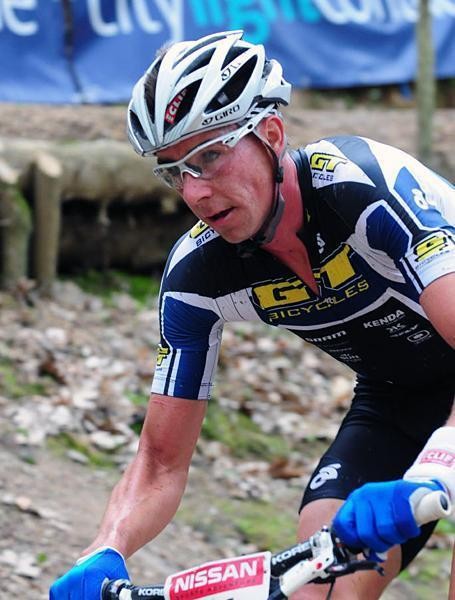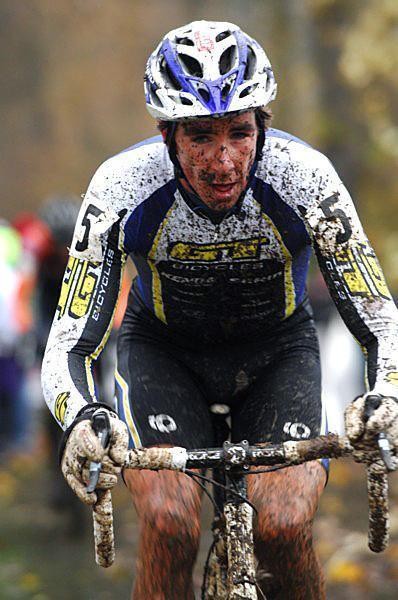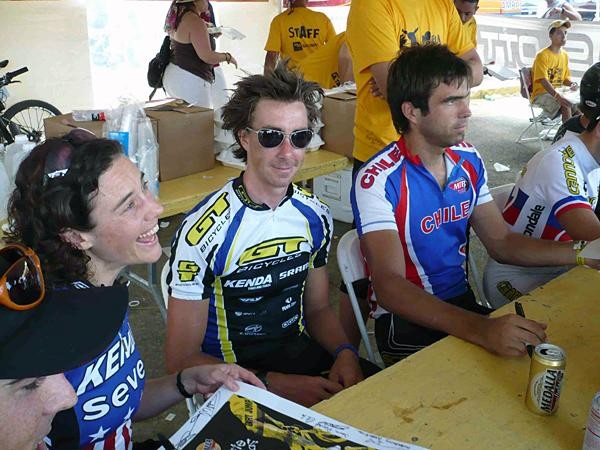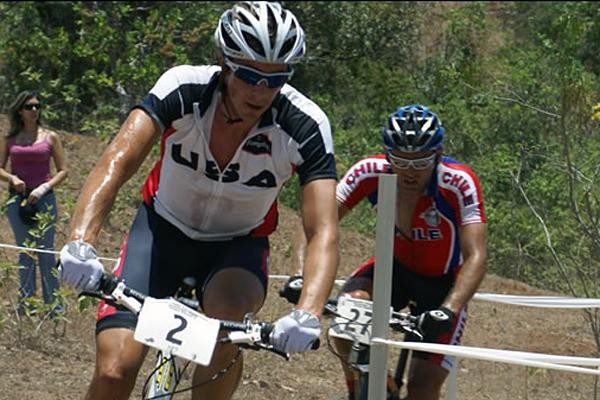A world of potential for Wells
If you don't succeed at first, try again. This is a phrase that GT mountain bike and cyclo-cross...





An interview with Todd Wells, May 1, 2008
Todd Wells turned in his best ever international cross country result in Houffalize, finishing 11th and riding as high as seventh, within seconds of the greatest names in mountain bike racing. Cyclingnews' Luke Webber talks about BMX, golf and living the European lifestyle with the new leader in the race for a spot on the American Olympic Games team.
If you don't succeed at first, try again. This is a phrase that GT mountain bike and cyclo-cross racer Todd Wells must be all too familiar with, considering his story so far in bike racing - and probably golf, too. Finally after six years on the European World Cup circuit, something which by his own admission is the toughest around, Wells realised a lifelong dream. Getting there has been anything but the traditional route however and can only be explained as a labour of love.
From the age of five, Wells raced BMX locally and then nationally during an 11-year period, but never reached the top grade. Disillusioned with the racing scene, the usual teenage distractions of parties, girls and cars took over, and BMX was left behind for two years. After his break mountain biking was starting to boom and Wells was back on two wheels having fun, wondering why he had stopped his involvement with cycling.
"Originally I thought I'd race dual slalom because a lot of the BMX guys were making that switch back then, like Brian Lopes and Eric Carter," said Wells. "But then all my friends started to race cross country and I lived in the woods where there were a lot of mountain bike trails, so I followed them to the first race in New Jersey."
Like everyone's first race it was a baptism of fire after the starting stampede. "It was so rocky and back then I rode a rigid bike," said Wells. "Looking back it's amazing I actually kept going after that experience. Since I was an Expert in BMX I thought I would enter the expert class in cross country , which was a bad move. I started out fast and I faded even faster, finishing dead last. [I] laid down on the grass and when I got home I slept for 16 hours straight."
This would be enough to discourage most novice mountain bikers for life, but for Wells it was the turning point from mountain biking for fun to aspirations for the podium. "I was still having fun and every day I rode I got stronger," said Wells. "Even when I finished dead last it was faster than I ever rode before."
Get The Leadout Newsletter
The latest race content, interviews, features, reviews and expert buying guides, direct to your inbox!
This dedication was mirrored in Wells' decision to move with a friend to Durrango - the centre of the American mountain bike race scene - to go to school and to see what it would take to make it as the best. Names etched in mountain bike folklore and faces only seen in the magazines were now becoming training partners on the road, where it was possible to sit in wheels and soak up the punishment. Ned Overend, Missy Giove, John Tomac and Julie Furtado were regulars and Wells was living his dream.
"It was really cool riding with all those guys at their prime - that was really inspiring," he said. "I could see riding with them where I needed to be. It was then I decided I needed to do something - I saw the houses those guys were living in and saw the dream! And I pretty much committed to try to make it as a pro while in school."
Right time, right place
Surrounding yourself with the right people is half the battle in bike racing and Wells had made the perfect choice. After some encouraging results, including a win in the Collegiate championships held in Durango, the first offer came in - to ride with Ned Overend on the Specialized setup. Along with an unshakable work ethic, this ensured a quick progression into the professional ranks, staying on the team and seeing the passing of Steve Tilford, Shaun Palmer, Bart Bentjens and Marga Fullana.
Disaster struck soon after though, with the decline of mountain biking in America. Despite having his best season, finishing in the NORBA Series' top 20, Wells was without a ride.
"That's when I decided to go back to school in Arizona and quit riding for two years before graduating and getting a real job with IBM as a project manager," he said. "It was a top job, but it was never as good as riding bikes."
In those few years out Wells got older, stronger and wiser, never truly losing sight of realising the dream he had chased back in Colorado. The comeback started as training while working.
"Even though that job was really good, it wasn't bike racing," said Wells. "For everyone out here racing week-in-week-out, bikes are their passion. And back then the guys I was working with at IBM, engineering was their passion, whereas for me it was a means to an end.
"I was planning on racing that year; saving all my money and trying to make a go of it," he added. "But I ended up having good results from the beginning and wound up on the Mongoose team and could stop working and race full time. That was 2001."
The comeback king
For many riders the first year as a full time professional after the security of a regular job is a deal breaker, but Wells saw things differently. He was so motivated about never working nine-to-five again that every aspect of his life would be geared toward getting the best results. Eventually his first forays into World Cup racing began and after two seasons passed, Wells became a regular on the circuit.
This was an achievement in itself, as for many Europe is a whole different world with technical difficulties far beyond the language barriers. In the past years, though, Wells has become something of an expert adapting - even entering the European timezone weeks before the first race of the year.
"Within the past five years there have been a lot of changes to help me out," he said. "When I first came out in 2002 I would be lucky enough to find some way to access the internet. But now I can get online anywhere. It's much easier to stay in touch which helps. Just having a laptop to watch TV on is big, now my cell phone works here and getting a GPS to ensure a stress free journey to the hotel is huge!
"All those little things add up," he added. "I also like to fly into the races as late as possible and even if there is just a two-week break I like to go home for that short time to recharge. It's a long trip but the mental break is essential."
Even with such meticulous preparation there is still a lot that can go wrong, and unfortunately before Houffalize last weekend it did. Despite being locked in the team truck with an ex-security guard camping outside and five demo bikes stacked on top, the team's race bikes were stolen. Fortunately team mechanic Mark had packed some fresh frames with new graphics to use later in the season, so Wells had the starting point of his bike.
With a lot of components to source, it was not certain Wells would hit the start line. Past experience however had taught him to keep cool and go into damage limitation mode. They still had road bikes and although riding the course was impossible, conditions were wet and cold.
"Being in a foreign country doing a sport where a lot of things can go wrong you have to learn to just roll with the punches," said Wells. "Last week when we had our bikes stolen that was out of our control – we just have to ignore that because it is beyond our control.
"Also, the racing here is so hard, it's only the best," he added. "Here if you make a mistake you drop 10 positions and everyone is fighting for that second so you can't afford to be distracted or waste energy over something that will probably see itself right."
It was a testament to Well's attitude then, that despite the numerous problems of the first World Cup that he still managed to bag a career-best result. With a chase for UCI points and number of team places decided, he could afford a slightly later approach to this first race.
"I always do the same 'cross programme, ending with the national champs," explained Wells. "Where it was a little different this year is that usually we are trying to get early season points for Olympic qualification, but this year that wasn't the case. I could do more of a transition phase because of this coming into Houffalize.
"I know I always ride good coming out of that base period and usually the World Cups don't come until a month after that," continued Wells. "By then I'm not quite totally fresh so I knew this year I was pretty good. Last year I felt sure I could hit top ten but it didn't come off."
Just two weeks ago though the result most definitely came off. From the line Wells made good progress into the top 15, got lucky in the singletrack and hit the top 10.
"The day before I was chatting to Burry [Stander who is Wells' team-mate - ed.] and we were figuring out which sections to run but when I got racing for the first time ever I think I had a clean run at everything," said Wells. "Burry has revolutionised European travel for me, having him around to hang out with is great, I relate better to young, immature people so we're perfect for each other!"
"I was pinching myself on the line to see if I was dreaming," he continued. "I came around the start loop and up the first road climb I could see the guys five seconds up the road. I felt I could bridge up but I didn't want to try anything silly. I wanted the race just to end there even though there were five to go! For the next bit I was on my own. I don't think it was a bad move because I was riding at a pace I could sustain and I could do what I wanted. Usually I would be getting passed by some angry Euros."
To get such a result at what riders see as the only mountain bike classic comparable to the road was the icing on the cake for Wells. "I like the Houffalize course based on the spectators and tradition," said Wells. "I don't want to say it has the most history but definitely it has the coolest feel of any race. To have [Julien] Absalon say it is the racers' race and the big one to win says it all. For me it's best to say it has the most mystique."
Last weekend, after more than 20 years of trying, Wells finally lined up on the front rows with his Euro mission accomplished and as favourite to make the US squad for August's Olympic Games in Beijing. Despite his strong result in Belgium, which he followed with a 23rd in Germany the next weekend, Wells is happy to take his results as they come.
"It's taken me six years to get a good result, so I'm not counting on getting that every weekend," said Wells. "And if I am never up there again, I'm grateful for being up there and having the chance to ride, but, of course, I am hoping it isn't a fluke! As for the Olympics, I'm not sure what I'd do to prepare for those - maybe I will have to do some motor-pacing with a funnel attached to the exhaust?!"
We're not sure that is the best idea to prepare for the conditions in China, as it could end an otherwise promising cycling career. If Wells does ever decide to move away from the sport again though, he always has golf to fall back on.
"This Euro trip is killing my golf game. It was not that good in the beginning and when I take a month off, it's like starting out again," he laughed. "Hopefully I'll get a chance to play St. Andrews when we go by Fort William."
OK, so maybe golf isn't the best option. But who knows, if he spends as much time trying to hit straight as he has to make it to the top of the bike game Wells could be killing the seniors' league in 30 years time. Watch out Tiger!